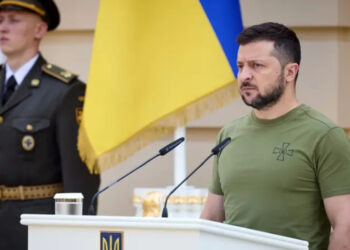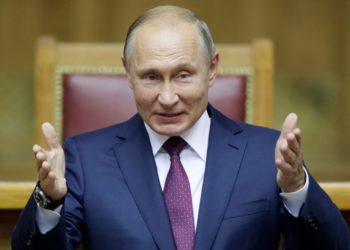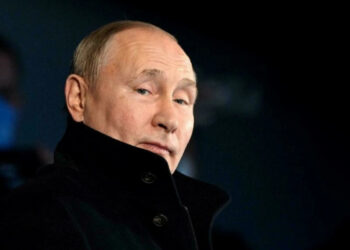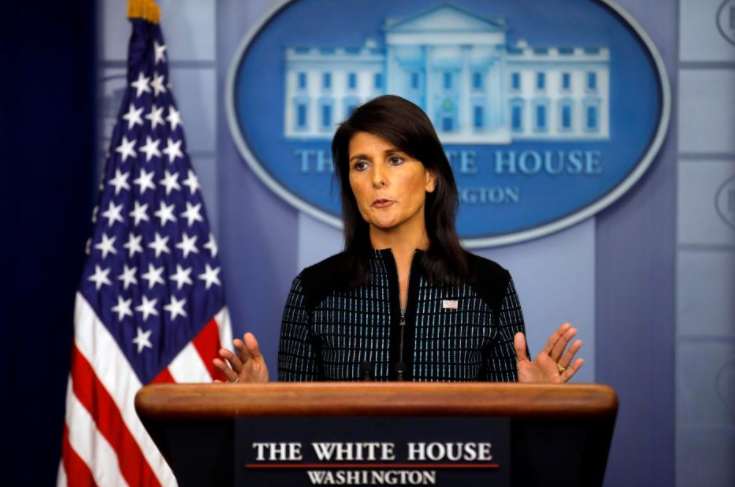August, Chayetina, Western Serbia. The mountainous region of Zlatibor is pristine and peaceful. The pine woods come to life as dozens of children and young people gather for a summer camp. Spirits are high, and smiles are seen all around. This could be any summer youth camp. The youngsters, however, are dressed and geared in fatigues, line up and listen to a middle-aged drill instructor issuing commands. This is not just any summer youth camp, but the military Zlatibor 2018 camp for youth aged 12 to 23, organized by the Russian ultranationalist E.N.O.T. Corp. This group has a strong taste for mercenary and paramilitary activities in Eastern Ukraine.
This particular camp is just one of the many initiatives directly and indirectly backed by the Kremlin, according to openly available information. Such camps, as well as their adjoining “fitness clubs” and “patriotic education clubs,” belong to a broader structure that is part of the modern Russian mobilization policies of President Vladimir Putin.
The Zlatibor training camp has been officially closed since mid-August after intense pressure from leading politicians of Serbia’s Liberal Democratic Party. News about the controversies of these camps and other types of patriotic initiatives are usually confined to the borders of Eastern Europe and do not make global headlines. They are deemed insignificant, occurring at the geographic and social margins, and hence underreported. However, they are clear symptoms of a larger and more complex process of incorporating seemingly bottom-up Russian civic initiatives and weaponizing attendants at home and abroad.
Zlatibor camp organizer Zeljo Vukelic, a Serbian war veteran, claims that the participants arrived there on a voluntary basis only. That might be true, but it is also very likely that the information about the actual activities is skewed, leading to parents providing consent without knowing what really happens at the camps. Financial support, Vukelic claimed, comes from the municipality of Chayetina and a war veterans association that he heads. However, elsewhere he admitted that the military camp has received support from the Russian embassy in Serbia and that the army officer serving with the embassy has paid a visit.
Disguising Military and Tactical Training
Camps such as the one at Zlatibor provide predominantly military and tactical training masked and advertised as “self-defense exercises” and “outdoor orientation improvement skills.” This allows organizers to claim that the camps are purely Scout-type gatherings.
Interestingly, the interviews and accounts of the organizers paint a rather different picture than the innocent one presented to the public. It becomes clear that besides tactical drills and military skills acquisition, the camp emphasizes on so-called “patriotic education” provided not only by Serbian instructors but equally by Russian ones. These drills are supervised by the E.N.O.T. Corp representative Alexey Saburov, an instructor with paramilitary experience along with the E.N.O.T. Corp that is active in Eastern Ukraine and other zones with marked Russian mercenary presence.
E.N.O.T. Corp is composed of war veterans who participated in different conflicts. Most of them are former Russian volunteers that actively supported the Serbian military units during the Yugoslav wars. Together with these Serbian war veterans, E.N.O.T. Corp develops patriotic clubs in Serbia and Eastern Europe.
Before the Zlatibor camp in Chayetina was closed, it had the local authorities’ permission to operate. On closer scrutiny, it becomes clear that the camp location was not chosen arbitrarily, as Chayetina is the only Serbian city to have a municipal-level operational Office for Cooperation with the Russian Federation. The Zlatibor camp was devised to have regional outreach, as the municipal deputy mayor expressed his satisfaction with Serbian, Montenegrin, Bosnian, and Russian youth gathering at the campsite.
Isolated Case or Part of Pattern?
If we rewind to 2015 and focus on events unfolding 1,200 kilometers eastwards of Serbia, in Belarus, we will see camp gatherings similar to the one described above.
In Grodno, Western Belarus, the patriotic Slavs and Outfit clubs under the auspices of the local Orthodox church are running a training camp, where youth are introduced to tactical and automatic weapons techniques. The pictures the attendees took stand as a vivid testament to the patriotic segment of their camp training: aggressive promotion of militant religious Orthodoxy, restoration and cult-like adoration of Russian monarchism, as well as a mixed bag of seemingly incompatible Russian ultranationalist ideas from different historical periods. The participants are not afraid to call Belarus “Western Russia” when posting their propaganda on Russian social media.
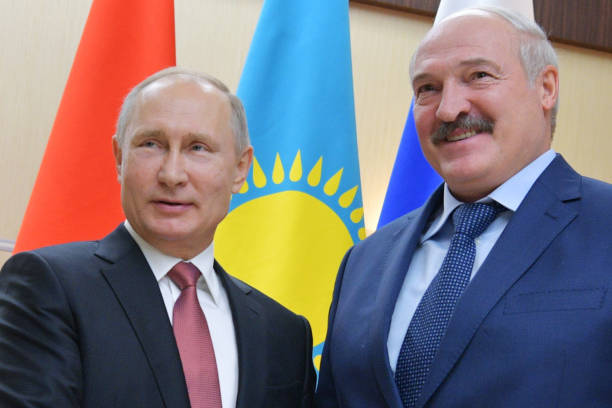
Some of the most active members and instructors at these groups and camps are Sergey and Petr Zubatsky. In 2015, their activity as young “soldiers of Christ” for the purposes of the larger “Russian world” drew the attention of Belorussian investigative journalists. The Zubatskys proudly declared to be a part of a larger Cossack movement, referring to an ethnic, semi-military community living in Southern Russia and Ukraine. However, in Belarus’ history, there are almost no Cossacks at all.
Like the location of the Serbian camp, the sites in Belarus are not chosen at random. Grodno is the only area in the country with a concentration of Catholics and has long attracted significant attention of Russian nationalists and the Orthodox Church in Belarus. The latter is quite aware of the existence of the camps, according to the data of local media.
In 2015, there were at least five patriotic and orthodox clubs in the Grodno region, such as Outfit backed by the Epiphany Church in Shchuchyn, the Knights at St. Vladimir’s Church, Bella Rus at the St. Alexander Nevskiy Church in Vertells, and the Brotherhood Club connected to another church in Grodno.
In addition to these, there was a minimum of 14 other organizations in cities such as the capital Minsk, Brest, Berezino, and Polock. All of these clubs are brazenly pro-Russian ultranationalist in orientation and keen to recruit youth, even the so-called “troubled children” associated with aggression and broken homes.
As in Serbia, the camp in Grodno is led by former military and paramilitary personnel. Features of this training and instruction can be observed elsewhere too, for example in Bulgaria at Vasil Levski, the paramilitary Committee for National Salvation, and the Shipka Bulgarian National Movement that drew attention in the summer of 2016.
Despite Bulgaria being an E.U. member, these organizations have developed surprisingly strong activities in the country’s border region with Turkey. In the Strandza mountains, the organizations train youth to act as paramilitaries under the guise of “refugee civic arrests” and “border push-backs.”
The programs are permeated by symbolism similar to the pro-Russian groups in Ukraine. The organizers openly call for a change of the current constitutional and foreign policy orientation of Bulgaria. An interesting fact is that this paramilitary activity was energetically supported by figures as Tatjana Festerling, a member of the organizational team of the German nationalist, anti-Islam, and far-right political movement PEGIDA.
Patriotic Ties
The common denominator for the camps in Zlatibor and Grodno is the presence of ties between the local organizers and the Russian ultranationalist E.N.O.T. Corp. The Racoons, as this group is called, might not have gathered the same notoriety and international recognition as Russian private military company Wagner but appear to be quite active in Ukraine, the Balkans, and Eastern Europe in general.
In contrast to Wagner, E.N.O.T Corp seems to have a dual purpose: the group is not only used as foreign policy instruments but also internally mobilizes ultranationalist and religious sentiments, as well as neutralizes opposition back home. Their genesis from street enforcers to active combat mercenaries with punitive tasks in Lugansk (Ukrainian city held by a rebel group since 2014) are quite illuminating regarding their ideological design, modus operandi, and recruitment mechanism.
E.N.O.T Corp’s story is closely connected to the persona of the Muscovite Igor Mangushev, one-time leader of the non-registered Svetlaya Rus, the patriotic movement whose specialty by own admission was to create an “atmosphere of horror” for illegal immigrants and pedophiles in Moscow. Thus, Mangushev’s patriotic activities several years ago were mainly concentrated on assaulting and purging immigrant homes in Moscow and other Russian cities, while performing civic arrests just as the ones practiced by the Shipka Bulgarian National Movement later.
These activities were executed under the watch and probably with the consent of the local police. Self-described as “moderate nationalist,” Svetlaya Rus is driven by quite a curious cocktail of ideological elements. It heavily emphasizes the virtues of traditional religious conservatism mixed with ideas of monarchist revival and xenophobic and far-right beliefs. This mish-mash of seemingly incompatible ideas has found its fanbase and drawn the support of certain quarters of the Russian neo-Nazi underground. The glue that holds the organization together proved to be quite strong, as the radical faction led by Mangushev has progressed to the establishment of E.N.O.T. Corp, with a structure similar to the other Russian private military companies operating in Eastern Ukraine. The E.N.O.T Corp officially specializes in humanitarian assistance provisions in occupied Ukraine, but unofficially stayed true to their initial enforcers’ specialty that they perfected on the streets of various Russian cities.
The case of Mangushev and his colleagues is emblematic regarding the interaction between the Russian far-right, the Orthodox church, patriotic clubs, unions, and the provision of mercenary personnel that appears in active combat zones of importance to Kremlin. It also clearly illustrates the approach to youth indoctrination aimed to be exported to other countries, such as Serbia and Belarus, where these groups nurture and maintain an under-the-radar type of networks aided by former war veterans, pro-Russian ultranationalists, and Orthodox clergy.
These at first glance incompatible elements of the network are glued together by their attachment to different ideological facets of the patriotic cocktail mixed and distributed to the trainees, but overall, they are bonded by their hatred of the “decadent, liberal order” upheld by the “collective West.”
The camps serve as a focal point for this bonding, possibly spotting and eventually recruiting trained personnel that can either be deployed in “hot” areas marked by Russian “grey zone” activities or be encouraged to become part of the security establishments in their respective countries.
The Russian-sponsored patriotic games for internal and foreign consumption clearly demonstrate the current demographic. They target the next generation of active “Russian world” supporters and possible paramilitary personnel. They also highlight the curious composition and grade of the toxic ideological brew being served to future recruits to fuel their loyalties, as well as direct and focus their hatred towards designated pre-selected targets.
Disclaimer: The views and opinions expressed here are those of the author and do not necessarily reflect the editorial position of The Globe Post.



